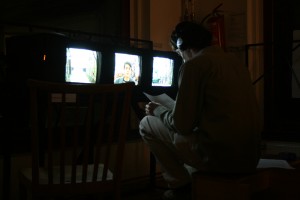Video installation: 3 screens – 3 loops (23 min, 49 min, 23 min), DV PAL / 2008 Austria
In 1208, exactly 800 years ago, Gmünd was founded. On the basis of the Contract from Saint Germain on the 10th September 1919, the town of Gmünd fell into two parts; Gmünd was added to Austria, and the railway station, railway repair shops and parishes in its surroundings to the new established town Czechoslovakia called České Velenice. In 1938, during the Hitler leadership, the historic border between lower Austria and Bohemia disappeared. At first, České Velenice took the name of Gmünd-Bahnhof and secondly, of Gmünd III. In 1945, after World War II, Gmünd III and its railroad were again separated from Austria and once again, it became České Velenice. For forty-four years, the two cities are divided with barbed wire. In 1989, the border was opened and the Austrians and Czechs could move from one city to the other.¹ My research in this area aims to point out the experiences of the people who live in proximity of the border and cross it everyday.In particular, I would like to pay attention on the point of view of the young generation and to reflect their ways of thinking and to see different cultural identities.Since 2008, this borderland, as many others in Europe², is part of the Shengen free-zone. The Shengen Treaty, signed in 1985 in a Luxembourg town that gave it its name, abolishes border controls and removes travel restrictions for citizens of its member countries. No passports or identification cards are requested in such places.Czechs and Austrians can now freely move from one country to the other. The guard constructions, which are located between the two territories, are empty. I conducted ten interviews with young people who are living or studying in Gmünd or České Velenice, and from these, I noticed that the reasons why a Czech or an Austrian person decides to cross the border, are mainly economic. Austrians go to České Velenice for buying cheaper products (cigarettes, clothes, food) or to go to one of the many night clubs. Chezchs go to Gmünd to use the shopping center, where they can buy products that are difficult to find in the nearer Czech cities, to go at work or school. What is missing seems to be the personal relationship between the people from the two cities. Invisible barriers seem to have grown. The only place where it is effectively possible to get in contact or to develop personal relationships, is at school. However, I would say the people do not seem to have a strong interest in making friends or developing relationships. I think that if the European policy goal is to have a stronger union between states, it should be equally important to develop resources to have a harmonious blend among European citizens. For example, especially in these borderlands, it’s essential that the local institutions provide the citizens with the opportunity to have cultural, linguistic, political and social exchanges. It’s important to educate people to live harmoniously together, to create a meeting between different realities which should be considerate not as a way to mark differences, but as a process of growth. Social structures should be developed, as ideas-laboratories, which would decrease mental distances. Especially in the era of globalisation, where new technologies bring us to be more connected with each other and in a time characterised by continuous movements of money, goods and people, we should definitively overcome the notion of personal distance and search a new way to feel connected with other people. It’s necessary to give the chance to the people to eliminate fears and to overcome psychological and cultural barriers. In fact, we should consider the border not just as a line that separates two political or geographical areas, but also as a cultural and psychological entity. The notion of border is often a mental construction on which people project fears and prejudices. The ideas and judgements that many people have about foreigners are often deformed by the beliefs of those who claim to have the “power” to talk and be listened to. For example, the outsider is often seen as the one who steals jobs but not as the victim of an unhealthy system which moves the labour force upon his production needs. Rather, the immigrant should be seen as a hard-working person who lives in poor conditions and that – as a matter of bureaucracy – is rejected from natural affection and tender feelings. Further still, she/he could be considered a pioneer, a person that – once she/he gets tools such as money, skills and knowledge – will eventually help to construct a new line of thought and a new development in his own country. It’s important to see the other not as the stranger but as a source of richness from which we can amplify our reflections and point of views about life and existence in other parts of the world. A world which we are all a part of.
¹ This information have been taken from www.gmuend.at/ www.velenice.cz/
² Actually the country which are part of the Shengen area are 24. The new states which entered on the New Year’s Eve 2008 are Czech Republic, Slovakia, Hungary, Poland, Estonia, Latvia, Lithuania, Slovenia and Malta.
